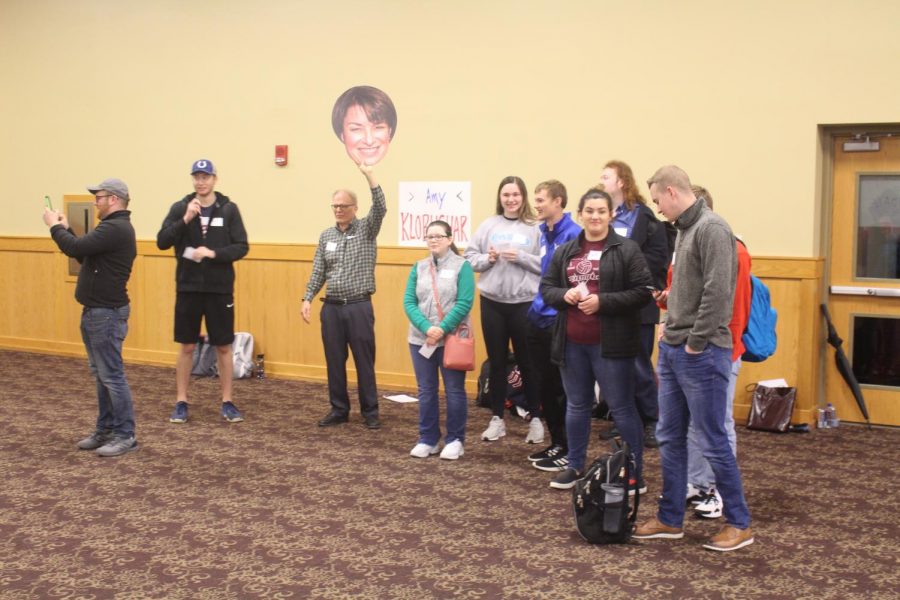IUS hosts Mock Iowa Caucus, voting drama ensues
Event allowed students and faculty to participate in a caucus while learning how the process works
Joe Wert, IUS professor of political science, tries to rally support for Amy Klobuchar. Klobuchar would go on to finish with the third most voters in the IUS Mock Caucus, which awarded her one delegate.
February 21, 2020
IUS students and faculty took over the Hoosier Room on Tuesday, Feb. 18 to participate in IU Southeast’s first ever Mock Iowa Caucus. The goal was to educate those involved and also have a decisive winner, unlike 2020’s controversial Iowa caucus, which featured a questionable vote-counting app.
The event, sponsored by the School of Social Sciences, the American Democracy Project and Campus Life, allowed the participants to show their political interest and understand what it is like to participate in an actual caucus.
The Democratic presidential candidates voters could choose from were Bernie Sanders, Mike Bloomberg, Joe Biden, Amy Klobuchar, Pete Buttigieg and Elizabeth Warren. Those candidates were represented by social sciences professors Veronica Medina, Gregory Kordsmeier, Jean Abshire, Joe Wert, Quinn Dauer and Jennifer Ortiz respectively.
Bernie Sanders and Elizabeth Warren amassed the most support from voters. However, after a write-in vote for “Jesus” was submitted by a Sanders voter, the contest resulted in a temporary tie, splitting the delegates and making this event all too similar to the real Iowa caucus.
Getting Started
Margot Morgan, assistant professor of political science, began the event by explaining how a caucus works. Each candidate representative gave a one-minute speech about why they should be elected. After each speech, the voters moved on to their preferred candidate’s station.
If a candidate had less than 15 percent of the vote, their voters could either stay put and not get counted or move to another station. The remaining candidates received delegates based on the percentage of voters they have. The mock caucus had five delegates to split.
Each representative was given the microphone to speak their peace. Some used their time to mention only their policies while others threw in jabs at the other candidates. After the speeches, the students made their decisions.
Voting Results and Controversy
Bloomberg and Biden received just one vote a piece. Their representation quickly folded. Buttigieg fell short initially, but was saved by the Biden voter who came over to support, pushing the Buttigieg team to 15 percent.
Warren, Klobuchar and Sanders split the remaining voters nearly evenly. By headcount, Sanders seemed to have narrowly won the election and took two of the five delegates. That seemed to hold true, until the paper ballots were counted.
As it turns out, a Sanders voter wrote in Jesus on their ballot, hereby disqualifying their vote, meaning that Sanders and Warren actually tied. The fate of the last delegate will be decided by a coin flip, according to Morgan.
Reaction and Praise
Both students and professors praised the event, saying it was a great experience for everyone involved, even though it was promoted on relatively short notice.
Jean Abshire, associate professor of political science and international studies, said she was very happy with the turnout and thought it would be a lot of fun to participate in a caucus considering not every state has one.
“Especially for the first time out and announced honestly kind of late, I thought it was a great turnout,” Abshire said. “I am really happy about that.”
“A caucus is a really unusual thing. Obviously not every state, not everyone has a caucus. I have never done a caucus before and I thought it would be fun.”
Joseph Kelley, a senior double majoring in psychology and sociology, was intrigued when he saw it being advertised in Crestview Hall and thinks they should consider doing this again.
“I saw the flyer in Crestview and I thought it would be an interesting opportunity to see how the caucus process works,” Kelley said. “Especially when it is so fundamental to the process of American democracy.”
“I am really glad that IUS offered this and I think that for as long as parties offer caucuses, I feel like we should probably continue to do this.”
Veronica Medina, associate professor of sociology, did not hesitate at the opportunity to participate.
“Part of the reason I participated in the mock caucus was because I feel that a lot of our students don’t really know much about political participation or civic engagement,” Medina said. “I wanted to support my colleagues in the social sciences who are doing civic engagement programming and the mock caucus was just a really fun way to get involved in that. Plus, I really enjoy sharing my own perspectives on politics.”
Medina was also pleasantly surprised with the turnout and hopes that IU Southeast will continue to do events like these.
“It was very successful in the sense that we had a very, very short window in which to advertise,” Medina said. “Dr. Morgan told me that she expected a very small turnout and was pleasantly surprised when the turnout was probably five times as many people as she expected.”



